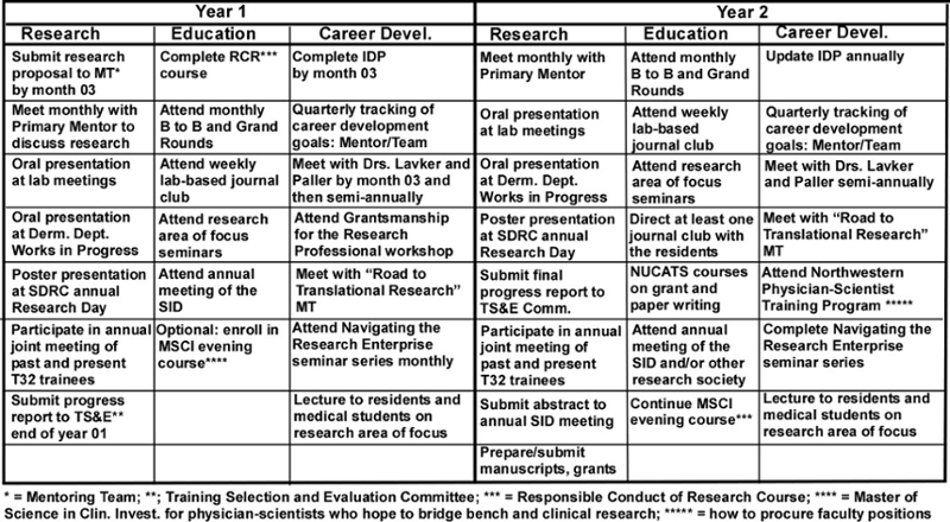Curriculum
Areas of Focus
Research endeavors within the T32 in Cutaneous Biology largely fit into six basic areas, with several faculty involved within each.
Educational Enrichment Activities
In addition to "lab training," a major focal point of the program centers in educational enrichment activities. Each trainee participates actively in the many seminars and research meetings offered locally and nationally.
Laboratory Meetings with the Primary Mentor
At these frequent working meetings of individual laboratories, fellows present their ongoing work to other fellows, senior investigators, students and technicians. The fellows present hypotheses and proposed approaches to addressing them, as well as recent data and interpretations. The format is a general discussion, not a formal presentation. Troubleshooting for difficult problems is frequently done. Issues of running a laboratory (such as safety, compliance and ethics), are also explored. Discussion of a pertinent, newly published article may also be initiated by a fellow in lab meeting. In some instances, lab meetings are combined between two groups with shared interests related to their shared laboratory research projects, enabling expanded feedback opportunities for the fellows. Importantly, each fellow has regular one-on-one meetings with the primary mentor and at least two meetings annually with the mentor team.
Journal Clubs
Trainees are encouraged to attend and participate in the dermatology residents' Basic Science Journal Club. It's designed to review basic science progress in the literature and teach residents and fellows to read literature critically. The resident chooses an article or cluster of similar articles that they consider a major advance in dermatology; the resident then guides a discussion regarding the article(s), to which the group participates and critiques the paper(s). These quarterly workshops provides an education in both new areas on the frontiers of science as well as how to critically evaluate the literature. This journal club also provides examples of superb papers as models. T32 trainees lead one to two journal clubs annually.
Research Seminars
Pathology, Cell & Developmental Biology, Biochemistry & Molecular Genetics, Dermatology and the Skin Disease Research Center all have graduate and postdoctoral research seminar series that are frequently relevant to our areas of focus. Other relevant research seminars are listed below.
Bench to Bedside Rounds
These are held right before monthly Grand Rounds.
Chicago Cytoskeleton
The Chicago Cytoskeleton holds two meetings in the fall and two meetings in the spring, bringing together scientists working in this area from nearby institutions. Trainees in epithelial-mesenchymal communication and epithelial differentiation will attend these biannual meetings.
Epithelial Cell Biology Club (ECBC)
ECBC meets every other Friday at the lunch hour. This multidisciplinary program provides a forum for laboratories to present their research in a "work in progress" format to obtain feedback from a large group with wide ranging-expertise. Participating laboratories come from Cell & Developmental Biology, Dermatology, Medicine, Microbiology-Immunology, Pathology, Pediatrics, Neuroscience and Surgery. Topics include epithelial-mesenchymal communication and epithelial differentiation, genomics/epigenomics, immunology, metabolism and wound healing/skin regeneration. Similar to the Works in Progress series, trainees learn to critically analyze unfamiliar data and communicate this analysis to others in a professional manner, fielding questions and receiving suggestions.
Fibrosis & Repair Group Colloquium
Fibrosis and Repair Group Colloquium, which focuses on problems related to wound healing and accompanying fibrotic conditions, brings together physician-scientists and scientists from universities within the greater Chicago Area on a monthly basis. This colloquium led to the establishment of the new Northwestern Fibrosis Research Consortium.
International Institute of Nanotechnology (IIN) Frontiers in Nanotechnology Seminar Series
IIN is for trainees working in the research focus of bioengineering and nanotechnology.
Lectures in the Life Sciences
This monthly, campus-wide lecture series brings scientists of international stature to Northwestern. Once a year, a visiting professor who specializes in mucocutaneous biology joins the series.
Multidisciplinary Melanoma Group
The group meets to discuss difficult patients and bench/clinical trials research related to melanoma.
Tumor Cell Biology Lecture Series & Translational Research on Solid Tumors (TRIST) Program
TRIST provides a weekly forum for investigators and fellows at Northwestern as well as other institutions to present their research, as well as a seminar on the last Thursday of every month.
Works in Progress
The Department of Dermatology's Works in Progress series meets on the first Monday and third Wednesday of every month. The faculty, research fellows and research assistants attend, as well as interested members from other departments. This enables the fellow to present their work at a forum with considerate, constructive suggestions and ideas related to the work. In addition, it gives the fellows experience in oral presentation. The faculty also present their work at this seminar, which gives the fellows models of various methods of presentation and a more global understanding of research in cutaneous biologic research both in the dermatology department and from scientists from other departments. As a forum for research in progress, the group often troubleshoots together and discusses future plans. The sessions also provide the opportunity for fellows to practice presentations before national meetings.
Coursework
During training, fellows are strongly encouraged to participate in courses on statistics, grant writing and writing a research through Northwestern University Clinical & Translational Sciences Institute.
Fellows also have the opportunity to take evening classes toward a formal degree program, such as Master of Science in Clinical Investigation for the physician-scientist who hopes to bridge bench and clinical research.
Sample Yearly Timetable
